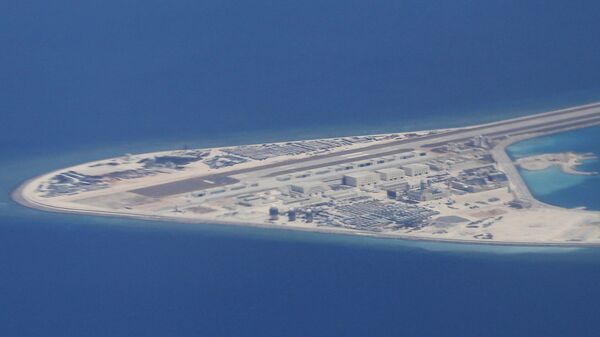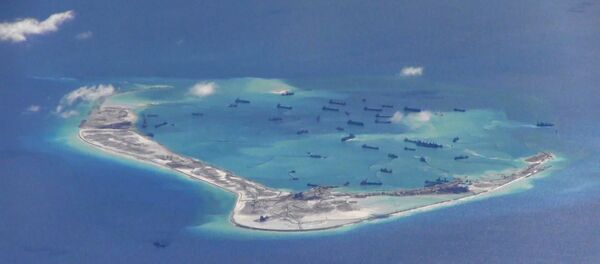The Chinese military has installed anti-ship cruise missiles and surface-to-air missile systems on three reefs of the disputed Spratly Islands, which six countries in the region have territorial claim over, US media reported on Wednesday, citing US intelligence reports.
During a regular briefing on Thursday, Chinese Foreign Ministry spokeswoman Hua Chunying defended China’s deployment of missile systems, stressing "the relevant deployment targets no one" and reiterating "anyone with no invasive intention will find no reason to worry about this."
READ MORE: What's Behind China's Alleged Missile Deployment in the Pacific?
White House Press Secretary Sarah Sanders told reporters on Thursday that the United States has "raised concerns" with the Chinese side over the issue, warning "there will be near-term and long-term consequences."
Lock and Load
As China continued to boost its military presence in the South China Sea by building artificial islands and constructing additional military facilities in recent years, the United States, wary of growing Chinese influence in the Asia-Pacific region, started to conduct freedom of navigation operations (FONOPs) while trying to secure support from neighboring countries.
READ MORE: China to Face Consequences for Militarizing South China Sea, White House Warns
The deployment of Chinese defense missile systems on the disputed islands could greatly aggravate the chances of military clashes between the two nations, if the United States decides to continue to conduct FONOPs in the region in the future, military analysts warned.
"It’s worth noting that the missiles are deployed on islands where the United States had previously conducted FONOPs off. The deployment means that American warships would now be within targeting range of the Chinese should new FONOPs be carried out. The question now is would more South China Sea FONOPs be carried out despite the credible ‘anti-access/area-denial’ umbrella that Beijing has created? If the answer to that question turns out to be ‘no,’ the United States would be seen to be backing down in the face of the Chinese missile threat. If the answer turns to be a ‘yes,’ we could expect some edgy encounters between US warships and Chinese forces on South China Sea islands, however, if either side were to lock their radar on the other party’s forces like what the PLA Navy did in 2013 on a Japanese warship, things could take an ugly turn if cooler heads do not prevail," Ben Ho, a naval analyst with the Military Studies Program at Singapore's S. Rajaratnam School of International Studies, told Sputnik.
Chinese military experts expressed similar concerns of future military clashes between China and the United States, while stressing that both countries do not want to start a war.
Militarized South China Sea
In response to the deployment of Chinese missile systems, the United States is likely to boost its military presence in the South China Sea by bringing in additional warships and conducting FONOPs more frequently, Ho from Singapore's S. Rajaratnam School of International Studies suggested.
"The United States and its allies could continue to execute FONOPs, and should this be the case, it is conceivable that more than one ship would be deployed. So far, US FONOPs have been single-ship endeavors and having more than one ship would enable better protection for the whole operation. The United States and its allies could also respond to increased Chinese militarization in the SCS by longer and larger deployments of naval forces in the South China Sea. In addition, we can expect to see more patrols in the South China Sea involving the biggest ‘stick’ of them all – the American carrier strike group – if Washington wants to be effective in its strategic messaging," he said.
The Singapore-based expert believes neighboring countries in the region could also seek to upgrade their weapons systems to counter the installation of the Chinese missiles.
READ MORE: Financial Experts: US Will Fail to Undermine China-South America Free Trade Deal
"Any response from neighboring countries will be in the form of how best to counter the Chinese weapons. The Chinese missiles’ long-range could mean that regional states will have to acquire even longer-ranged weapons, and they do not come cheap. That said, these states could go for the cheaper option in the form of ‘soft-kill’ measures, such as electronic countermeasures. All in all, the South China Sea littoral could get further militarized and this does not bode well for regional stability," he said.
US Hegemony
Chinese military analysts argued that the United States wanted to maintain its global hegemony and avoid showing weakness in trying to stop China from taking control of the South China Sea.
"The United States does not want China to control the South China Sea. From the Chinese perspective, this [the South China Sea] is part of our territory. We can do whatever we want on our own territory. The deployment of the missile systems is for defense purpose. For the United States, from the perspective of its national interests, especially its military presence and influence in East Asia, it cannot remain silent regarding to the situation in the South China Sea. If China can achieve its territorial claim over the South China Sea, it’ll be a sign of weakness for the United States and its hegemony. This conflict is like water and fire, which will only escalate in the future," Ni from the University of Politics and Law in Shanghai said.
The Shanghai-based expert believes neighboring countries in the region would try to avoid jumping on the bandwagon of either side and switch their positions easily depending on how the situation unfolds in the future.
"Generally speaking, the neighboring countries would just sit and watch. They would never stand on the Chinese side or the US side completely. It all depends on how the situation develops. If China squeezes them tighter, they could move closer to the United States. For example, Vietnam has shown willingness to work with the United States closely, by inviting USS George Washington to visit its port. They [Vietnam] just want to use this as a bargaining chip against China," Ni said.
The expert stressed that China understands concerns from neighboring countries and would invite them to jointly develop the South China Sea.
The views and opinions expressed by the speaker do not necessarily reflect those of Sputnik.




